Everything you need to know about COVID-19 in Alberta on Thursday, Dec. 31
Alberta tops 100,000 total cases since start of pandemic
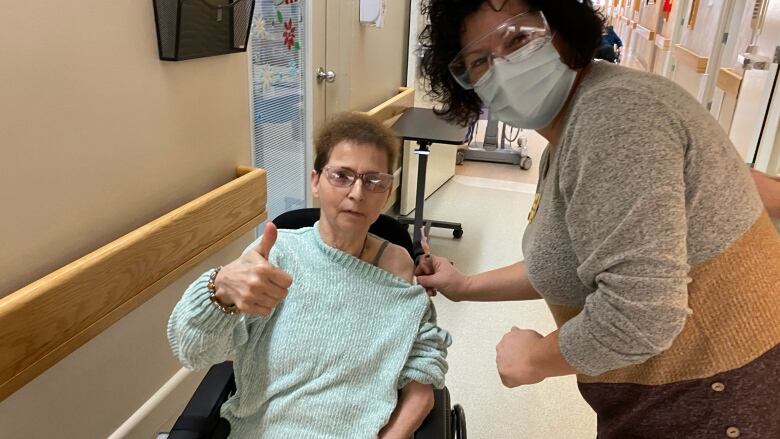
The latest:
- Siksika Nation has received its first shipment of the Moderna COVID-19 vaccine, and will begin immunizing staff and residents at the Siksika Elders Lodge on Friday.
- CBC News has learned that Alberta Municipal Affairs Minister Tracy Allard spent time this month in Hawaii on a family vacation, despitedirection from both the federal and provincial governments to avoid non-essential travel during the pandemic.
- Dr. Deena Hinshaw, Alberta's chief medical officer of health, tweeted Thursday that11,102 doses of COVID-19 vaccine have been administered in Alberta as of Wednesday, although she didn't say how many were people who had received two doses of thePfizer-BioNTech vaccine that requires two doses to be effective. That falls farshort of the 29,000 health-care workers that, only two weeks earlier,Premier Jason Kenney's government pledged to vaccinate by the end of December.
- Residents and staff of long-term care facilities in Alberta began to be vaccinated on Wednesday, witha 63-year-old Medicine Hat woman becamethe first long-term care resident in the provinceto receive the Moderna COVID-19 vaccine.
- Thefirst shipment of the ModernaCOVID-19 vaccine arrived in Alberta on Tuesday.Unlike thePfizer-BioNTech vaccine, the Moderna vaccine does not require ultra-cold storage and therefore can be offered more easily to residents at continuing care facilities. The government said the initial 16,900 doses of the vaccine would be sent tolong-term care facilities inEdmonton, Calgary, Medicine Hat, Lethbridge, Grande Prairie, St. Paul and Fort Saskatchewan,as well as six on-reserve First Nation living facilities.
- After residents and staff of long-term care and supportive living facilities, immunization will focus on seniors age 75 and over, and residents age 65 and over of First Nations and Mtis communities.
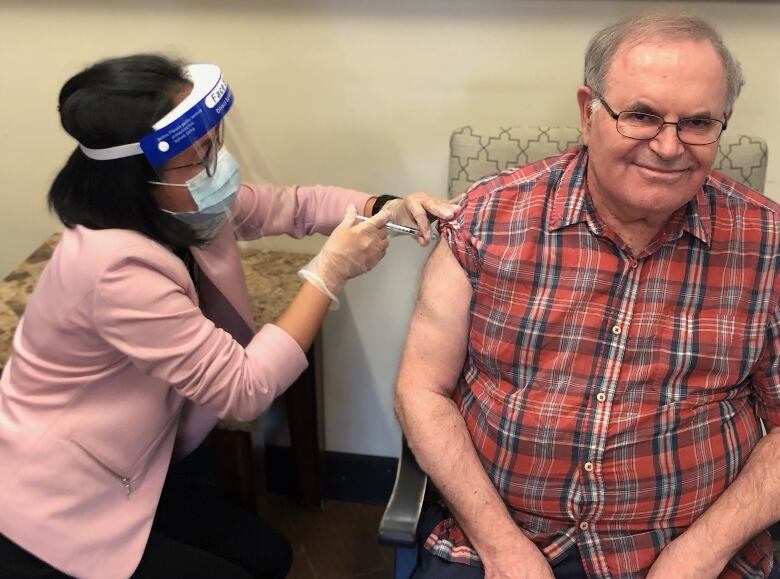
- A health-care aide at an extended care facility in Red Deer, Alta., has been charged under theFederal Quarantine Act after allegedly failing toisolate aftera trip to the United States.
- On Thursday, Alberta becamethe first province to officially say the NHL can play games in its arenas for the upcoming season.
- New rules requiring air travellers to test negative for COVID-19 before entering Canada will kick in on Jan. 7, Transport Minister Marc Garneau said Thursday.
- The 2020 tax season will look different for many Albertans, financial experts say.For many, the pandemic changed theirjob situation, the source of theirincome and introduced unexpected expenses like medical or childcare.
- Hinshawtweeteda "preliminary" update Thursday morning,sayingan estimated 1,200 new COVID-19 cases have been confirmedout of 16,900 lab tests on Wednesday, making for a positivity rate of seven per cent.
- She said hospitalizations were "increasing" while intensive-care bed usage was "stable," but did not give numbers of total active cases, hospitalizations, ICU use or new deaths.
- As of Wednesday's more fulsome update, there were are 769 people in non-ICU hospital care,plus another 152 in intensive care for a total of 921 that had been steady for two days.
- Alberta had14,555 active COVID-19 cases as of Wednesday's update down from 14,828 the previous day.That total has been slowly declining since Dec. 13, when the numberpeaked at 21,112.
- Alberta's total case count topped 100,000 on Wednesday as the province reported 18 more deaths for a total of 1,046 deaths.The average number of deaths per day has been trending sharply down since Dec. 27.
- However, ittook nearly nine months for Alberta to record its first 500 deaths; the next 500 came in just 34 days. Check out how ithappened in thisanalysis.
More than 1,000 Albertans have now died from COVID-19.
The first 500 died over a span of nearly nine months.
The next 500 died in just over one month. pic.twitter.com/CbLokhVJH3
—@CBCFletch- Albertans were told before the holidays to expect similar Twitter updates each day untilJan. 3. On Jan. 4, the province is expected topost more complete updates online. Hinshaw is scheduled to hold her next news conference on Tuesday, Jan. 5.
- Here are more of thelatest Alberta COVID-19 stories:
- Calgary pizzeria ordered to close dining room after serving food to laid-off staff, manager says
- Couple hosts drive-in wedding as 28 carloads of gussied-up guests watch from parking lot
- New year, not open: Fort McMurray gym owners frustrated by COVID-19 shutdown
- Moms are welcoming the first wave of 'coronial' babies but experts say to expect fewer births
- Families may spend almost $700 more on groceries in 2021: report
More detail on what you need to know today in Alberta
Dr. Deena Hinshawtweetedthe latest estimated COVID-19 numbers on Thursday, saying there are roughly1,200new cases of the virus in the province, based on16,900 tests, for a positivity rate of seven per cent.While Hinshaw did not provide exact numbers, she saidhospitalizations are increasing and the number of people being treated in ICUisstable.
Another preliminary update will be provided on Jan 1. Hinshaw's next live update is scheduled for Tuesday, Jan.5.
More than 100,000 Albertans have tested positive for COVID-19 over the course of the pandemic.
Hinshaw said earlier in the week that declining case numbers are in part due to fewer tests, and hospitalizations and the positivity rate have remained high.
As of Wednesday, there were921 people in hospital, including 152 in intensive care, and another 18 people haddied for a total of 1,046 deaths.
Click on the map below to zoom in or out on specific local geographic areas in Alberta and find out more about COVID-19 there:
Here isthedetailed regional breakdown of active cases updated as of Wednesday.
- Calgary zone: 5,129, down from 5,244 reported on Tuesday(33,152 recovered).
- Edmonton zone: 6,624, down from 6,701(36,165 recovered).
- North zone: 1,031, down from 1,034 (5,752 recovered).
- South zone: 296, down from 302 (4,629 recovered).
- Central zone: 1,430 down from 1,466(4,995 recovered).
- Unknown: 45, up from 38(134recovered).
Find out which neighbourhoods or communities have the most cases, how hard people of different ages have been hit, the ages of people in hospital, how Alberta compares to other provinces and more in: Here are the latest COVID-19 statistics for Alberta and what they mean
Siksika Nation has received its first shipment of the Moderna COVID-19 vaccine, and will begin immunizing residents and staff at the Siksika Elders Lodge on Jan.1 at 1 p.m.
"We are pleased to see that a safe and effective vaccine has been developed so quickly and made available to our most vulnerable Nation members and their careproviders,"Nioksskaistamik Ouray Crowfoot, Chief of Siksika First Nation, said in a news release on Thursday.
"Our health services continue to plan for a staged roll-out of additionalvaccine to other priority groups in the near future."

Alberta is the first province to officially say the NHL can play games in its arenas for the upcoming season.
In a statement to The Canadian Press on Thursday, the Alberta government said it approved Edmonton and Calgary for competition on Dec. 25 following the review of protocols outlined in the league's return-to-play plan, along with some additional enhancements.
That confirmation is the first from any of the five provinces with NHL teams since deputy commissioner Bill Daly stated on Dec. 24 that the league believes it can play games in all seven Canadian markets.
The Canadian teamswill only play each other during the regular season and the first two rounds of the playoffs as part of a newly formed North Division, and won't be crossing the border with the United States, which remains closed to non-essential travel because of the COVID-19 pandemic.
As of Wednesday, 11,102 doses of COVID-19 vaccine have been administered in Alberta, Hinshaw tweeted Thursday, although she didn't say how many were people who had received two doses of thePfizer-BioNTech vaccine that requires two doses to be effective.
Kenney had estimated Tuesday that7,000 Albertans would have been vaccinated by the end ofday, far short of the government's pledge to vaccinate 29,000 health-care workers by the end of December.
Kenney said Alberta Health Services (AHS) had been holding back some vaccines for a second dosebut wouldmoveforward to vaccinate as many people as possible to catch up, including scheduling vaccinations on New Year's Day. Retired nurses and students were also being brought in to help speed up the rate of vaccinations.
How did things go so wrong, so quickly in Alberta? It's all aboutexponential growth, notes CBCinvestigative journalist Robson Fletcher.
Early on in 2020, Alberta was gettingaccustomed to looking across the country and feeling pride in itssuccessful pandemic response, but now the province finds itself in uncharted territory. After keeping the disease relatively at bay for months, deferred decisions late in the year led to an unprecedented amount of illness and death.
In the spring, the province boasted about itslow hospitalization rate, itsnation-leading testingand how it hadquadrupled its ranks of contact tracers.
Come winter, Albertahad thehighest hospitalization ratein the country andtest-positivity rates that were nearing 10 per cent. Thousands of people were told todo their own contact tracingafter the provincial system was overwhelmed.
Medical experts and mathematicianstried to sound the alarm nearlytwo months agoabout the trajectory the province was on. But the government was reluctant to impose new restrictions on Albertans' liberties and economic activity. It rebuffed repeated calls for stricter public-health measures for a time.
Meanwhile, the exponential growth continued unabated, with the number of new daily cases doubling every two to three weeks. Whether in response to the physicians' warnings, or the fact that new case numbers were approaching the psychological barrier of 2,000 per day, the government eventually did act.
But by that time, the hospitalizations and deaths the province is now experiencing had been essentially baked in. Daily case counts have mercifully started to ebb, but the glut of disease that built up weeks ago is still filling more hospital beds and claiming more lives than Alberta has seen at any other point in the pandemic.
Remembering some of the Albertanswho have been identified as killed by COVID-19:
In a year of cancelled plans and postponed events,a Calgary couple decided to keep their wedding datedespite COVID-19 restrictions by making it a drive-in event.
After ayear and a half of wedding planning, Chris Hibberd and Anistasia Mechefske were supposed to be married in front of 150 guests on Wednesday.
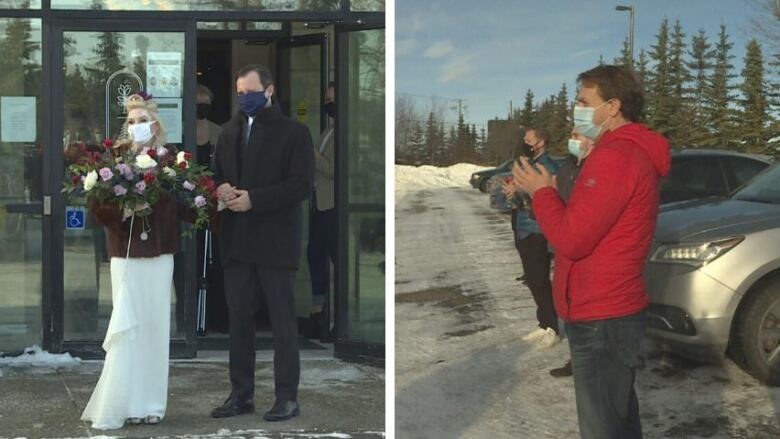
Unfortunately for the couple,the pandemic threatened to derail their plans, buttheyeventually decided to get married anywayand still found a way to include family and friends.
Hibberd and Mechefske were married in a masked 10-person ceremony at Flores & Pine restaurant in Bearspaw on Wednesday while28 cars full of wedding guests caught the ceremony on Zoom in the parking lot outside and drove away with a special treat.

After a disastrous 2020, the Calgary Stampede is touting the slogan"we'll ride again." But there are still plenty of unknowns.
Just like the rest of the world, the organization was figurativelybucked off and stomped by avirus in 2020.
The president of the Calgary Stampede and chairman of its board of directors, Dana Peers, said talks with the federal and provincial governments on a financial aid package have not reached any conclusions.
"They recognize certainly that we're a unique organization. To date, there hasn't really been any assistance programs that fit the Calgary Stampede and I really don't know where those conversations will go in the future."
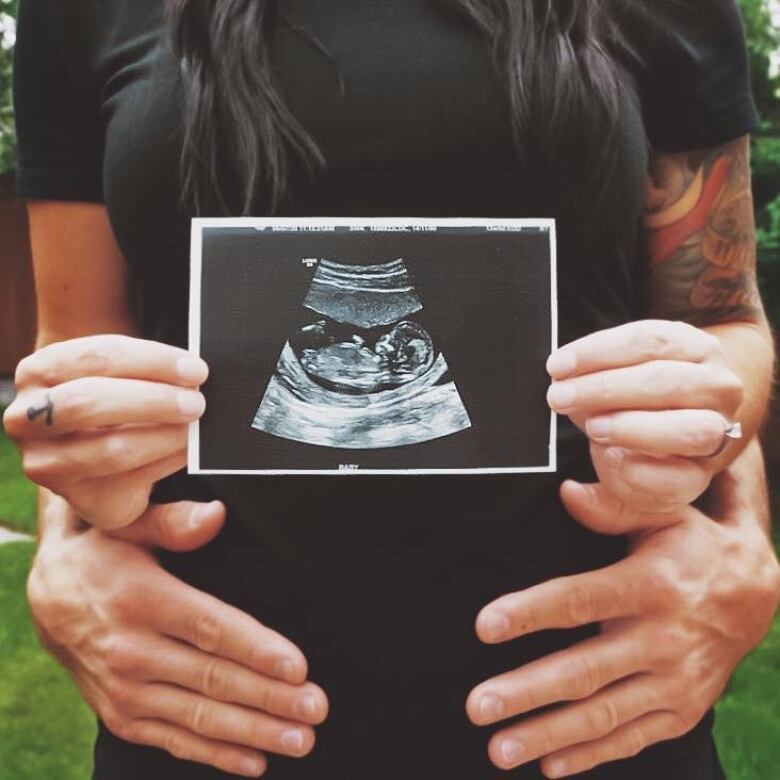
Going through a pregnancy during the isolation of the pandemic has been emotionally and physically exhausting for many Alberta women.
And nearly 10 months after Alberta's first presumptive COVID-19 case was confirmed, mothers across the province are giving birth to what some have dubbedthe coronialgeneration.
Kennedy Amyotte's first-born child will open her eyes to the world and see her mother's face behind a mask.
For Amyotte, pregnancy during the isolation of the pandemic has been emotionally and physically exhausting. She spent weeks in quarantine following a COVID-19 diagnosis last month and wonders how she and her husband, Shane Flamond, will navigate parenthood in the uncertain months ahead.
Amyotte expects to tell her daughter about it someday, years down the road.
Alberta Health Services ordered a restaurant to close to in-person dininglast week after an inspector reported finding people from different households sitting near each other, enjoying aself-service buffet and alcohol.
But the manager ofLittle Tavern Pizza Project, in the southwest Calgary neighbourhood ofStrathcona Park, says it was actually a staff meeting.
"We never offered dine-in service to anyone from the 13th on," saidKeith Luce.
The province had ordered restaurants and pubs to close their dining rooms on Dec. 13, in order to slow the spread of COVID-19 in Alberta.
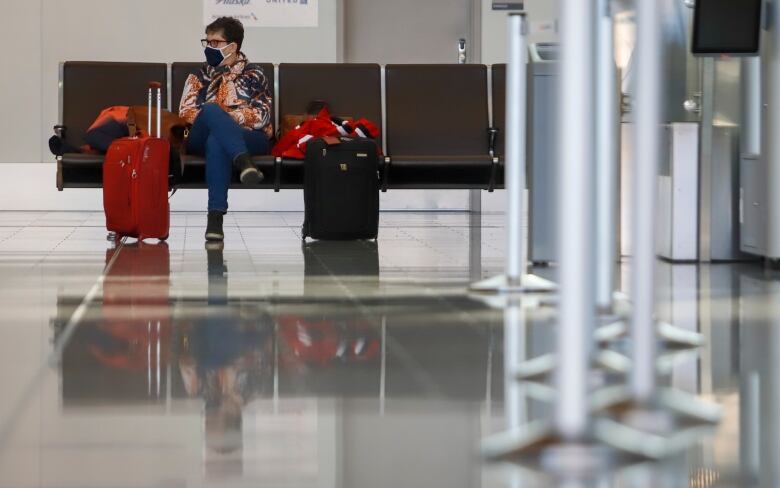
The winter holidays are usually the busiest season for air travel. But this year, about 80 per cent fewer travellers will pass through the doors of the Calgary International Airportin late December, according to the airport authority's spokesperson.
About 50,000 travellers take off from or land atCalgary International Airportper day during the holiday season in an average year, saidReid Feist, spokesperson for the Calgary Airport Authority.
But this year, the holidays fall amid the second wave of the COVID-19 pandemic, and many jurisdictions have discouraged all non-essential to prevent further spread of the illness. As a result, the airport authority predicted that only about 10,000 travellers would go through the Calgary airport "for the period before Christmas all the way through New Year's," said Feist.
"For those who have to travel for essential travel reasons, the airport remains open. And of course, our focus is on everyone's safety as they move through the airport or arrive at the airport," he said.
The Calgary airport is facing a $67-million deficit this year thanks to the unprecedented drop in demand for air travel caused by the COVID-19 pandemic.
Alberta Finance Minister Travis Toews says the goal in 2021 is to get vaccines out and put the COVID-19 pandemic in the rear-view mirror, then work to fix a battered and beleaguered economy.
But with a $21-billion deficit and Alberta's oil and gas economy still in flux, where's the money going to come from?
"We will not cut our way out of a $21-billion deficit," Toews said in a year-end interview with The Canadian Press. "We have to get the economy growing again. And economic recovery will very quickly become job No. 1 as we start to get past the pandemic."
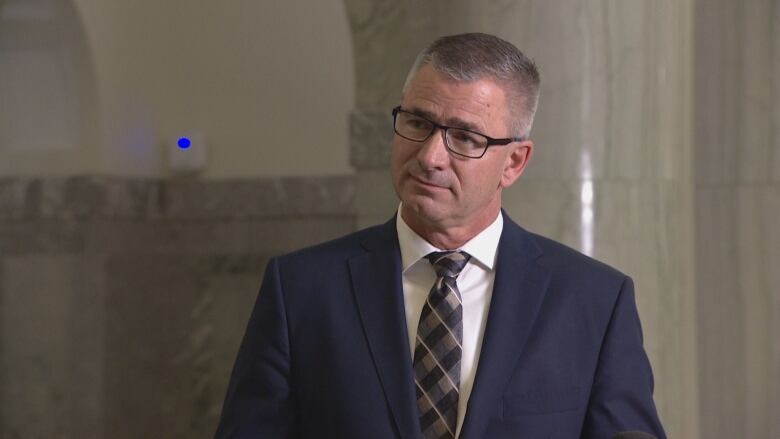
At the start of 2020, Kenney's United Conservative government was busy trying to resuscitate an already sufferingeconomy only to see COVID-19 blow everything apart and take with it Kenney'skey election promise to balance the deficit in his first term.
That goal is now adistant memory with a projected budget deficit this year tripling an original forecast of $6.8 billion. COVID-19 has slashed demand for energy, shuttered businesses and necessitatedrelief aid and job supports to keep people going.
- For the latest on what's happening in the rest of Canada and around the world on Thursday, see here.












_(720p).jpg)


 OFFICIAL HD MUSIC VIDEO.jpg)
.jpg)



























































































